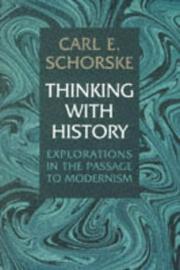- Summary
- "Schorske begins by reflecting on his own vocation as it was shaped by the historical changes he has seen sweep across political and academic culture. Then he offers a European sampler of ways in which nineteenth-century European intellectuals used conceptions of the past to address the problems of their day: the city as community and artifact; the function of art; social dislocation. Narrowing his focus to fin-de-siecle Vienna in a second group of essays, he analyzes the emergence of ahistorical modernism in that city. Against the background of Austria's persistent, conflicting Baroque and Enlightenment traditions, Schorske examines three Viennese pioneers of modernism - Adolf Loos, Gustav Mahler, and Sigmund Freud - as they sought new orientation in their fields."--BOOK JACKET.
- Format
- Book
- Author/Creator
- Schorske, Carl E.
- Published
- Princeton, N.J. : Princeton University Press, [1998]
©1998
- Locale
- Europe
- Contents
-
The book: theme and content
The author: encountering history
The idea of the city in European thought: Voltaire to Spengler
History as vocation in Burckhardt's Basel
Medieval revival and its modern content: Coleridge, Pugin, and Disraeli
The quest for the grail: Wagner and Morris
Museum in contested space: the sword, the scepter, and the ring
Grace and the word: Austria's two cultures and their modern fate
Generational tension and cultural change
From public scene to private space: architecture as culture criticism
Gustav Mahler: formation and transformation
To the Egyptian dig: Freud's psycho-archeology of cultures
History and the study of culture.
- Notes
-
Includes bibliographical references and index.
The book: theme and content -- The author: encountering history -- The idea of the city in European thought: Voltaire to Spengler -- History as vocation in Burckhardt's Basel -- Medieval revival and its modern content: Coleridge, Pugin, and Disraeli -- The quest for the grail: Wagner and Morris -- Museum in contested space: the sword, the scepter, and the ring -- Grace and the word: Austria's two cultures and their modern fate -- Generational tension and cultural change -- From public scene to private space: architecture as culture criticism -- Gustav Mahler: formation and transformation -- To the Egyptian dig: Freud's psycho-archeology of cultures -- History and the study of culture.




